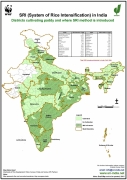 Paddy, one the country's staple crops is cultivated all over the country, barring parts of Jammu and Kashmir, Gujarat and Rajasthan. This set of interesting maps about Paddy and System of Rice Intensification (SRI) from the SRI India website, maintained by the WWF-ICRISAT Project (a joint initiative of WWF and ICRISAT), give a bird's eye view of the districts under Paddy and SRI Paddy cultivation, and the Paddy productivity in various districts of the country.
Paddy, one the country's staple crops is cultivated all over the country, barring parts of Jammu and Kashmir, Gujarat and Rajasthan. This set of interesting maps about Paddy and System of Rice Intensification (SRI) from the SRI India website, maintained by the WWF-ICRISAT Project (a joint initiative of WWF and ICRISAT), give a bird's eye view of the districts under Paddy and SRI Paddy cultivation, and the Paddy productivity in various districts of the country.
Districts with Paddy cultivation and where SRI approach has been introduced: Of the total 604 districts in India, paddy is cultivated in 564 districts. Of these, in 246 districts, SRI paddy cultivation approach has been introduced (data as of 2010). The spread of SRI has been most widespread in Uttarakhand, Eastern Madhya Pradesh, Orissa, Jharkhand, West Bengal, Andhra Pradesh, Tamil Nadu and Karnataka, as 50-95% of the districts in these regions/states have presence of SRI.
Districts where SRI is being practiced within the National Food Security Programme (NFSM): NFSM is being implemented in 136 districts. Of these NFSM districts, SRI is being practiced in 62 districts (data as of 2010). The states which have the maximum overlap of NFSM and SRI in terms of districts covered, are Madhya Pradesh, Orissa, Andhra Pradesh and Karnataka.
Productivity range of Paddy in India: Across India, the yield of Paddy, varies widely from less than 1 ton/hectare to over 5 ton/hectare (data as of 2006-07). The highest yields are achieved in Punjab, Tamil Nadu, Andhra Pradesh, and parts of Western and Northern Haryana and Northern Rajasthan. The lowest yields are achieved in Western Maharashtra, Northern and Western Madhya Pradesh, Southern Rajasthan, and parts of Assam, Mizoram, Manipur.
Download the maps: